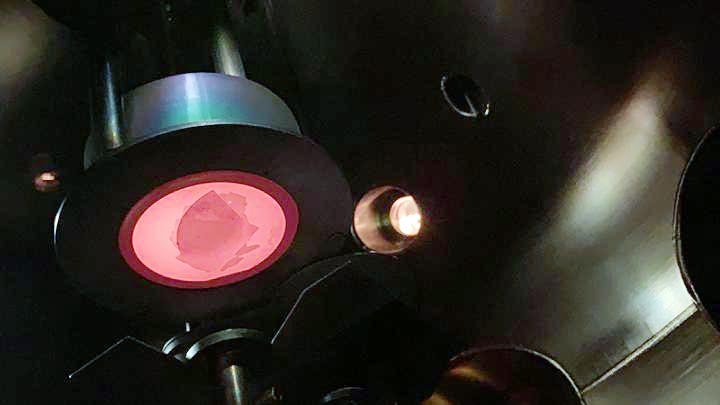Technology uses ‘single’ approach to develop electronics, acoustics

Purdue University innovators developed a new approach to creating popular thin films used for devices. This image shows work on a sample of that innovation while it was heating up.
Credit: Purdue University/Robynne Paldi
A Purdue University innovator has developed a new approach to creating popular thin films used for devices across a broad range of fields, including optics, acoustics and electronics.
Epitaxial lithium niobate (LNO) thin films are an attractive material for electronics and other devices. These films offer flexibility and other properties that are important to manufacturers.
The challenge is that these devices demand high-quality thin films that can be difficult to grow and produce. Haiyan Wang, a Purdue materials engineer, developed a new approach to creating these films. The work is published in Advanced Photonics Research.
“We created an approach that makes these films easier to produce,” said Wang, the Basil S. Turner Professor of Engineering in Purdue’s College of Engineering. “We developed a versatile nanocomposite-seeded approach that allows us to create single-layer films. Typically, engineers have used a double-layer approach, which adds to the complicated production process.”
This work is supported by Sandia National Laboratories through its Academic Alliance initiative. This technology work also is supported through Sandia’s Diversity Initiative.
“Our approach offers an efficient new option for optics, acoustics and electronics,” said Robynne Paldi, a Ph.D. candidate at Purdue who helped lead the research. “Our films are grown through a pulsed laser deposition method and growth conditions are optimized to achieve high-quality films that can be easily integrated into devices.”
The innovators worked with the Purdue Research Foundation Office of Technology Commercialization to patent their technology.
###
The innovators and OTC are looking for partners to continue developing their technology. For more information on licensing and other opportunities, contact Will Buchanan of OTC at wdbuchanan@prf.org and mention track code 2021-WANG-69382.
About Purdue Research Foundation Office of Technology Commercialization
The Purdue Research Foundation Office of Technology Commercialization operates one of the most comprehensive technology transfer programs among leading research universities in the U.S. Services provided by this office support the economic development initiatives of Purdue University and benefit the university’s academic activities through commercializing, licensing and protecting Purdue intellectual property. The office is located in the Convergence Center for Innovation and Collaboration in Discovery Park District, adjacent to the Purdue campus. In fiscal year 2020, the office reported 148 deals finalized with 225 technologies signed, 408 disclosures received and 180 issued U.S. patents. The office is managed by the Purdue Research Foundation, which received the 2019 Innovation and Economic Prosperity Universities Award for Place from the Association of Public and Land-grant Universities. In 2020, IPWatchdog Institute ranked Purdue third nationally in startup creation and in the top 20 for patents. The Purdue Research Foundation is a private, nonprofit foundation created to advance the mission of Purdue University. Contact otcip@prf.org for more information.
About Purdue University
Purdue University is a top public research institution developing practical solutions to today’s toughest challenges. Ranked the No. 5 Most Innovative University in the United States by U.S. News & World Report, Purdue delivers world-changing research and out-of-this-world discovery. Committed to hands-on and online, real-world learning, Purdue offers a transformative education to all. Committed to affordability and accessibility, Purdue has frozen tuition and most fees at 2012-13 levels, enabling more students than ever to graduate debt-free. See how Purdue never stops in the persistent pursuit of the next giant leap at purdue.edu.
About Sandia Labs
Sandia National Laboratories is a multimission laboratory operated by National Technology and Engineering Solutions of Sandia LLC, a wholly owned subsidiary of Honeywell International Inc., for the U.S. Department of Energy’s National Nuclear Security Administration. Sandia Labs has major research and development responsibilities in nuclear deterrence, global security, defense, energy technologies and economic competitiveness, with main facilities in Albuquerque, New Mexico, and Livermore, California.
Writer: Chris Adam, cladam@prf.org
Source: Haiyan Wang, hwang00@purdue.edu
All latest news from the category: Materials Sciences
Materials management deals with the research, development, manufacturing and processing of raw and industrial materials. Key aspects here are biological and medical issues, which play an increasingly important role in this field.
innovations-report offers in-depth articles related to the development and application of materials and the structure and properties of new materials.
Newest articles

Parallel Paths: Understanding Malaria Resistance in Chimpanzees and Humans
The closest relatives of humans adapt genetically to habitats and infections Survival of the Fittest: Genetic Adaptations Uncovered in Chimpanzees Görlitz, 10.01.2025. Chimpanzees have genetic adaptations that help them survive…

You are What You Eat—Stanford Study Links Fiber to Anti-Cancer Gene Modulation
The Fiber Gap: A Growing Concern in American Diets Fiber is well known to be an important part of a healthy diet, yet less than 10% of Americans eat the minimum recommended…

Trust Your Gut—RNA-Protein Discovery for Better Immunity
HIRI researchers uncover control mechanisms of polysaccharide utilization in Bacteroides thetaiotaomicron. Researchers at the Helmholtz Institute for RNA-based Infection Research (HIRI) and the Julius-Maximilians-Universität (JMU) in Würzburg have identified a…



